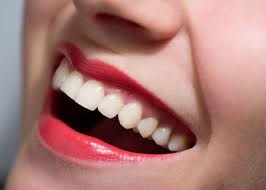Why We Like White
In reality, the natural colour of teeth ranges anywhere from a light grayish-yellow, through to a brownish-yellow. So why are we so fixated with the bright white smiles sported by Hollywood starlets and Politicians alike?
The reason may lie in the fact that we associate whiter-shades with youth and beauty. Teeth will naturally tend to darken as we age particularly after years of smoking or the consumption of beverages such as coffee, tea or wine. Whether it is consciously or not, we also consider white teeth to be an indication of good health.
Studies have consistently shown that we favour images of people with whiter teeth, giving them favourable ratings in the categories of age, attractiveness and health over people with yellowed teeth. Interestingly, though, this did not hold true when teeth became extremely white (the optical white that could only be achieved by extreme lightening methods). These were also judged negatively for a more “natural shade” of white.
Are There Other Solutions to Consider
If you are weighing up getting your teeth whitened, bear in mind that a good schedule of Oral Hygiene including daily brushing and flossing and regular dental check-ups can strongly contribute to a bright and healthy smile.
Getting a professional clean from your dentists every six to twelve months can remove many external stains and promote good oral health in general. Before embarking on any teeth whitening regime, whether you choose a DIY or professional option, it is advised that you first book in with your dentist examine of the condition of your teeth.
Looking at D-I-Y Whitening Methods
These days, there are quite a variety of “whitening” options available to consumers. There are, however, some risks associated with tooth whitening, especially with methods which are unsupervised by a professional. This can include heightened tooth-sensitivity and tooth-aches, damage to the gums surrounding the teeth, and even damage to the roots of teeth.
Your Dentist should be able to anticipate your susceptibility to these problems and sensitivities. Knowing this in advance can be invaluable as it gives your Dentist the chance to recommend ways of avoiding or alleviating discomfort while whitening. Often people will get teeth whitening after having Invisalign braces as the teeth may need a freshen up and as part of the teeth straightening process they also like to look white as possible
“Use at Homes” products such as toothpaste or chewing gums use specially-formulated abrasives to help remove the stained surface. Do-it-yourself teeth-bleaching systems are considered to be safe and effective IF (and it is a big IF) they are used appropriately. A tray or strip that doesn’t perfectly fit the line of teeth, for example, can lead to the surrounding gum absorbing some of the bleach perhaps causing irritation and damage.
What are the Risks of Whitening Your Teeth?
DIY options often require longer treatment periods thus increasing the risk of gum irritation and damage to existing dental work. The long-term effects of these at home tooth-bleaching methods are largely not researched, which may be of concern, particularly as many individual require repeated treatments over time.
Some DIY teeth kits can contain chlorine dioxide, the same acid that is commonly used in disinfecting swimming pools. This essentially whitens the teeth by etching the tooth surface. A process such as this can be very damaging to the protective enamel of a tooth causing on-going sensitivity. It may also damage the gums themselves which can contribute towards risk of losing teeth in the future.
Ironically, poor whitening methods could lead to teeth becoming even more discoloured long-term due to the protective enamel being damaged and teeth thereby being more exposed to staining from food and drink.
Teeth Whitening by Your Dentist
Certain tooth discolouration issues can only be dealt with professionally. For example, if a tooth is discoloured because of it no longer “alive” (perhaps due to a root canal) it would be necessary to bleach the teeth from the inside out. Tooth discolouration may also be caused by something more significant than external staining, perhaps a result of problems such as decay, or an undiagnosed abscess.
For surface teeth whitening, there are some professionally administered bleaching methods in use. The method best suited to you will depend on how many of your teeth need to be bleached and to what degree they have been stained or discoloured.
Your dentist may recommend methods that involve specially formulated gel along with heat and light to gain desired results. Other methods might involve applying prescribed tooth bleach into a custom made mouth-guard specifically designed to perfectly mould the unique shape of your teeth.
If you are in the Auckland area and would like further information on Teeth Whitening, Epsom Dentists come recommended with 20 years experience and will happily provide professional advice and assistance. Also, you can find out more teeth whitening information at General Dental Council.


